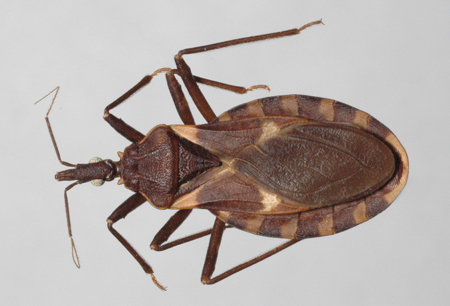Summary
Definition
History and exam
Key diagnostic factors
- prolonged fever
- palpitations
- syncope or presyncope
- hepatosplenomegaly
- enlarged lymph nodes
- tachycardia
- hypotension
- cardiomegaly
- dysphagia
- regurgitation/aspiration
- odynophagia
- substernal discomfort
- prolonged constipation
- acute abdominal pain
- abdominal distention
- swelling around the site of inoculation
- jaundice
- abdominal rebound tenderness
- clinical evidence of meningeal irritation
- clinical signs of a cerebral mass lesion
Other diagnostic factors
- irritability
- anorexia or fatigue
- vomiting or diarrhea
- headache
- myalgia
- reduced exercise tolerance
- dizziness
- thromboembolic phenomena (e.g., stroke, pulmonary embolism)
- dyspnea
- cough
- generalized edema
- pericarditis
- epigastric pain and/or hematemesis
- melena or hematochezia
- rash
- seizures or tremors
Risk factors
- living in endemic area
- exposure to Triatoma species
- low socioeconomic status
- consumption of contaminated food or drink
- blood transfusion
- organ transplantation
- history of immunosuppression
- climate change
- deforestation
- laboratory work occupations
- travel to endemic areas
- mother with Chagas disease
Diagnostic investigations
1st investigations to order
- CBC
- LFTs
- serum electrolytes, BUN, and creatinine
- microscopy: fresh blood
- microscopy: concentration methods applied to fresh blood
- microscopy: thick blood smear
- enzyme-linked immunosorbent assay based on parasite lysate
- immunofluorescent antibody test
- indirect hemagglutination antibody test
- chemiluminescence
- radio-immunoprecipitation assay
- western blot
- polymerase chain reaction (PCR)
- urinalysis
- serum or urine beta-hCG
- ECG with a 30-second lead II rhythm strip
- chest x-ray
- barium swallow
- barium enema
Investigations to consider
- culture (blood and cerebrospinal fluid)
- xenodiagnosis
- cerebrospinal fluid analysis
- coagulation profile
- ambulatory 24-hour ECG
- exercise testing
- echocardiography
- esophageal manometry
- upper gastrointestinal endoscopy
- cranial CT/MRI
- cardiac MRI
- nuclear medicine testing
- cardiac catheterization and coronary angiography
Emerging tests
- immunochromatography
- commercial polymerase chain reaction (PCR) kits
Treatment algorithm
accidental exposure and infection: nonpregnant without severe renal/hepatic insufficiency
accidental exposure and infection: pregnant or with severe renal/hepatic disease
acute infection
reactivated disease
chronic infection: indeterminate disease or mild to moderate symptoms: children
chronic infection: indeterminate disease or mild to moderate symptoms: adults
chronic infection: advanced disease: children and adults
end-stage organ failure
Contributors
Authors
Alejandro Marcel Hasslocher-Moreno, MD, MBA, MSc, PhD
Infectious Diseases Physician
Evandro Chagas National Institute of Infectious Diseases
Oswaldo Cruz Foundation (Fiocruz)
Rio de Janeiro
Brazil
Disclosures
AMHM was reimbursed by Faculdade Unyleya in Rio de Janeiro, Brazil, for coordinating a course on Tropical Medicine. He is also the author of several articles cited in this topic.
Acknowledgements
Dr Alejandro Marcel Hasslocher-Moreno would like to gratefully acknowledge Dr Alberto Novaes Ramos Jr, Dr Jorg Heukelbach, Dr Andrea Silvestre de Sousa, and Dr Francisco Rogerlândio Martins-Melo, all previous contributors to this topic.
Disclosures
ANR Jr is an author of a number of references cited in this topic. JH, ASS, and FRMM declare that they have no competing interests.
Peer reviewers
Christopher Huston, MD
Assistant Professor of Medicine
Division of Infectious Diseases
University of Vermont College of Medicine
Burlington
VT
Disclosures
CH declares that he has no competing interests.
Richard Reithinger, MD, PhD
Professor
London School of Hygiene and Tropical Medicine
London
UK
Disclosures
RR declares that he has no competing interests.
Peer reviewer acknowledgements
BMJ Best Practice topics are updated on a rolling basis in line with developments in evidence and guidance. The peer reviewers listed here have reviewed the content at least once during the history of the topic.
Disclosures
Peer reviewer affiliations and disclosures pertain to the time of the review.
References
Key articles
Nunes MCP, Beaton A, Acquatella H, et al. Chagas cardiomyopathy: an update of current clinical knowledge and management: a scientific statement from the American Heart Association. Circulation. 2018 Sep 18;138(12):e169-209.Full text Abstract
Dias JC, Ramos AN Jr, Gontijo ED, et al. 2 nd Brazilian Consensus on Chagas disease, 2015. Rev Soc Bras Med Trop. 2016 Dec;49Suppl 1(Suppl 1):3-60.Full text Abstract
World Health Organization. Chagas disease (also known as American trypanosomiasis). Apr 2025 [internet publication].Full text
Bern C, Montgomery SP, Herwaldt BL, et al. Evaluation and treatment of Chagas disease in the United States: a systematic review. JAMA. 2007 Nov 14;298(18):2171-81.Full text Abstract
Meymandi S, Hernandez S, Park S, et al. Treatment of Chagas disease in the United States. Curr Treat Options Infect Dis. 2018 Jun 26;10(3):373-88.Full text Abstract
Pan American Health Organization. Guide to the diagnosis and treatment of chagas disease. Jun 2019 [internet publication].Full text
Reference articles
A full list of sources referenced in this topic is available to users with access to all of BMJ Best Practice.

Differentials
- CNS toxoplasmosis
- Non-Chagas-related cardiomyopathy
- Toxic megacolon
More DifferentialsGuidelines
- CDC Yellow Book: health information for international travel - post-travel parasitic disease including evaluation of eosinophilia
- Clinical considerations for congenital Chagas disease
More GuidelinesLog in or subscribe to access all of BMJ Best Practice
Use of this content is subject to our disclaimer